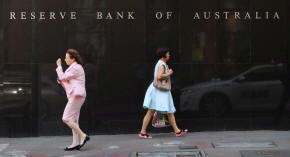|
Wrapping up its April policy meeting, the Reserve Bank of
Australia (RBA) kept its cash rate at 0.1% but noted inflation
had picked up and was likely to rise further, while unemployment
had fallen faster than expected to 4.0%.
"Over coming months, important additional evidence will be
available to the Board on both inflation and the evolution of
labour costs," said RBA Governor Philip Lowe in a statement.
"The Board will assess this and other incoming information as
its sets policy," he added, omitting any reference made in
previous statements to the Board being patient.
Markets took the change as a step toward an eventual tightening
and sent the local dollar up 0.9% to a nine-month high.
Previously, Lowe had said that it was plausible a first hike
would come later this year, while markets have long wagered on
an earlier move given how inflation has taken off.
Data for consumer prices is due on April 27 and analysts suspect
it could show core inflation jumped by 1.0% or more in the first
quarter to take the annual pace to at least 3.2%.
That would be the first time core inflation topped the RBA's
2-3% target band since early 2010 and make it harder to justify
retaining rates at emergency lows.
"The retirement of the 'patience' mantra and is an
acknowledgement that like the rest of the developed country
complex, inflation in Australia has and will surprise with its
magnitude and momentum," said GSFM investment strategist Stephen
Miller.
"The RBA wishes to avoid meeting an inflation target by causing
a recession, or allowing high and potentially destabilising
inflation to persist well into 2023."
Markets have long been priced for a June rate rise to 0.25%, and
imply no less than six more hikes to 1.75% by year end. Yields
on three-year bonds rose 6 basis points on Tuesday to 2.46%,
having already surged 87 basis points in March.
That aggressive outlook in part reflects expectations the U.S.
Federal Reserve will hike by 50 basis points in both May and
June, adding to pressure for other central banks to follow.
Any RBA rise would be a shock for local borrowers given they
have not seen an official increase since 2010 and households are
sitting on record levels of mortgage debt.
(Reporting by Wayne Cole; Editing by Sam Holmes)
[© 2022 Thomson Reuters. All rights
reserved.]
Copyright 2022 Reuters. All rights reserved. This material may not be published,
broadcast, rewritten or redistributed.
Thompson Reuters is solely responsible for this content.

|
|





